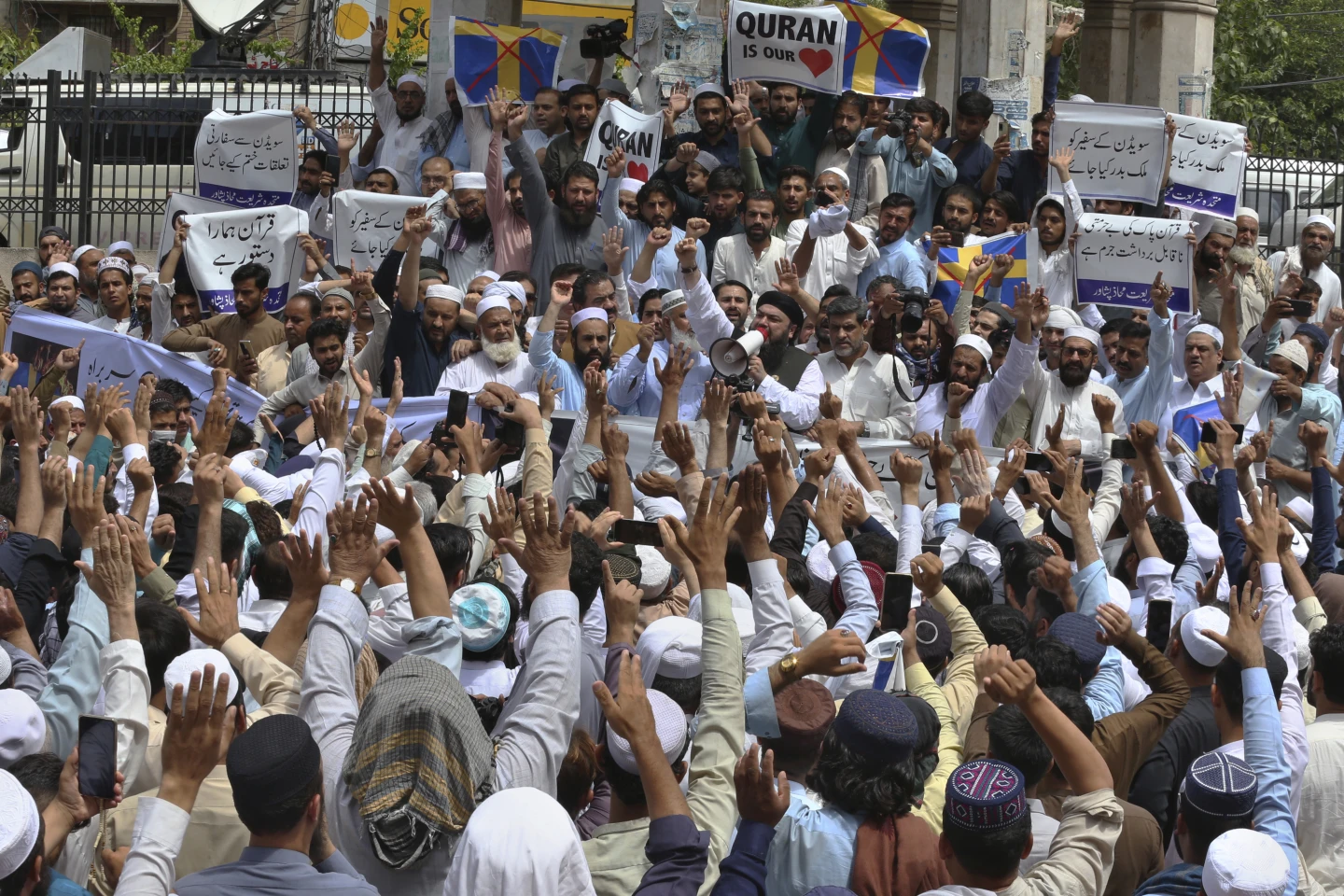ISLAMABAD (AP) — Muslims in Pakistan were holding rallies to observe a “Day of the Sanctity of Quran” after the South Asian Islamic nation’s Prime Minister Shehbaz Sharif issued a call for anti-Sweden protests over burning of the Islamic holy book in Stockholm. Pakistani Muslims join nationwide protests after Koran burning in Stockholm, Sweden. Both Prime Minister Shehbaz Sharif and former Prime Minister Imran Khan called for these protests and urged their compatriots to send a strong message to Sweden.
The protests are being held under the motto “Day of the Holiness of the Quran”. The largest demonstrations are expected in Lahore and Karachi, while smaller rallies have been held in other cities such as Islamabad, Peshawar and Quetta. Lawyers in Islamabad held a protest outside the Supreme Court with copies of the Koran, while believers also took part in a demonstration outside a mosque.
The protest calls for the severing of diplomatic ties between Pakistan and Sweden and the punishment of those responsible for burning the Quran. Supporters of various political parties have taken part in the protests, including Islamist extremist Jamaat-e-Islam Pakistan and the Tehrik-e-Labiak Pakistan (TLP) party, known for its strong stance against blasphemy laws.
The TLP has called for a boycott of all Swedish products and has previously organized violent rallies condemning acts seen as disrespect for Islam and the Prophet Muhammad. She made headlines in the 2018 Pakistani elections, mainly focusing on defending the country’s blasphemy law, which provides for the death penalty for insulting Islam.
Some Christian minorities in Pakistan have held rallies denouncing Koran burning, while Muslim leaders in Sweden have also condemned the incident. In a televised address, Prime Minister Shebaz Sharif questioned why Swedish authorities allowed the cremation. It is important to note that these protests reflect the sentiments of specific groups within Pakistan and should not be considered representative of the Pakistani people as a whole. The demonstration reflects the outrage and call to action of some Pakistani Muslims over the desecration of the Quran in Sweden.
Protests in Pakistan after the Koran burning in Sweden reflect the strong emotional reaction of some of the country’s Muslims. The incident has sparked outrage and calls for action, including severing diplomatic ties with Sweden and punishing those responsible for the crime.
The involvement of prominent politicians such as Prime Minister Shebaz Sharif and former Prime Minister Imran Khan shows the importance of the issue in Pakistan’s political landscape. Both leaders called for a nationwide rally and emphasized their common belief in upholding the sanctity of the Quran.
The involvement of various political parties and groups in the protest shows the diversity of religious and ideological perspectives within Pakistan. These include Jamaat-e-Islam Pakistan and Teliku-e-Rabiak Pakistan (TLP), the latter known for its radical stance on blasphemy laws. The TLP’s call for a boycott of Swedish products demonstrates a strong response and their desire to adhere to an interpretation of Islamic principles.
The protest also demonstrates the sense of solidarity among Muslims in Pakistan and the importance of the Koran as a sacred religious document. The rally outside the mosque by lawyers and devotees reflects a collective effort to express outrage at the blasphemy and demand justice.
It is worth noting that reactions in Pakistan do not reflect the views of all Pakistanis or all Muslims around the world. While the protests have gained momentum and support among certain groups, there are other voices in Pakistan who may have different opinions or prioritize other issues.
Moreover, denunciations of the Koran burning by Swedish Islamic leaders underscore the complexity of the situation and efforts to deal with the incident peacefully.
Overall, the protests in Pakistan illustrate the depth of religious sentiments and the importance placed on the protection of the Quran. They also reflect the influence of political figures in mobilizing public opinion and the diversity of perspectives within the country’s religious and political landscape.
